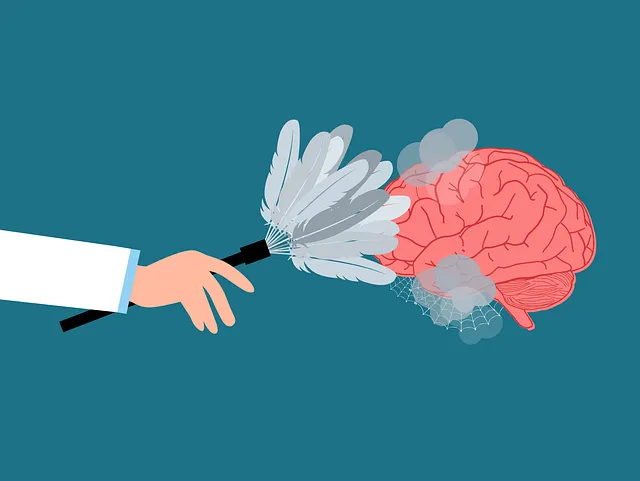Lakewood's Kaiser offers mental health services focused on Emotional Intelligence (EI), addressing a crucial aspect of well-being in today's stressful society. By emphasizing self-awareness, empathy development, effective communication, and mindfulness practices like Mindfulness Meditation, Kaiser equips individuals with EI skills to manage complexities, navigate relationships, and unlock their full potential for holistic well-being. Their services cater to diverse populations, ensuring culturally sensitive care and fostering a supportive community environment.
Emotional intelligence (EQ) is a powerful tool for personal and professional growth, enabling individuals to navigate complex social landscapes with grace. In this article, we explore the key components of building EQ, including self-awareness, empathy, communication skills, and mindfulness. Understanding these aspects can help you unlock your full potential, fostering deeper connections and enhancing relationships, both personally and in the workplace. Lakewood does Kaiser have mental health services? Yes, they offer comprehensive support, aligning with our quest to harness the transformative power of emotional intelligence.
- Understanding Emotional Intelligence: Unlocking its Power
- The Role of Self-Awareness in Building EQ
- Developing Empathy: Connecting with Others Deeply
- Enhancing Communication Skills for Better Relationships
- Practicing Mindfulness: Staying Present and Regulated
Understanding Emotional Intelligence: Unlocking its Power

Emotional Intelligence (EI), often referred to as ’emotional IQ’, is a powerful tool that goes beyond simple cognitive abilities. It’s about recognizing and managing your own emotions, as well as understanding and empathizing with others. In today’s fast-paced world, where stress and mental health challenges are prevalent, cultivating EI can be a game-changer.
Lakewood does Kaiser have mental health services? Absolutely! And this is where the power of EI becomes evident. Effective mental healthcare practices, like those offered by Kaiser, often incorporate techniques such as Mindfulness Meditation to enhance EI. By promoting self-awareness and emotional regulation, these strategies enable individuals to navigate life’s complexities with greater ease. Moreover, fostering cultural sensitivity in mental healthcare practice ensures that diverse populations receive support tailored to their unique needs and experiences, unlocking the full potential of EI in promoting well-being.
The Role of Self-Awareness in Building EQ

Self-awareness is a cornerstone in building emotional intelligence (EQ). It involves recognizing and understanding one’s own emotions, strengths, weaknesses, values, and motivations. This introspective practice allows individuals to develop a deeper sense of self, enabling them to navigate relationships and challenges with greater clarity and empathy. By cultivating self-awareness, folks can better recognize when stress management techniques, like those from the Mental Wellness Podcast Series Production, are needed to maintain mental health services accessible in their communities—in this case, whether Lakewood does Kaiser provide adequate support.
Furthermore, self-aware individuals tend to engage in compassion cultivation practices more frequently, which not only enhances their emotional resilience but also fosters positive interactions with others. This ability to recognize and manage one’s emotions is a key aspect of EQ development, promoting mental wellness and effective communication, even in the face of life’s complexities and challenges.
Developing Empathy: Connecting with Others Deeply

Developing empathy is a cornerstone of emotional intelligence and involves deeply connecting with others. It means understanding their feelings, perspectives, and experiences as if they were your own. This skill fosters meaningful relationships and enhances communication, allowing individuals to build strong, supportive networks.
At Lakewood, for instance, their mental health services, including Kaiser’s offerings, can play a significant role in teaching empathy. Through therapy sessions and support groups, individuals learn to recognize and interpret emotions in themselves and others, fostering an environment of compassion and understanding. Mental health education programs design activities that encourage active listening, perspective-taking, and recognizing non-verbal cues—all essential elements of developing empathy and, by extension, emotional intelligence.
Enhancing Communication Skills for Better Relationships

Effective communication is a cornerstone of emotional intelligence, fostering healthier relationships both personally and professionally. In today’s fast-paced world, where stress reduction methods are increasingly important, recognizing and understanding non-verbal cues, actively listening, and expressing emotions clearly can significantly improve connections. These skills promote empathy, ensuring that individuals feel heard and understood, thereby reducing the impact of mental illness stigma.
For instance, in a setting like Lakewood, where Kaiser offers mental health services, enhancing communication abilities can create a supportive environment. Patients may feel more comfortable discussing their experiences and concerns if they sense understanding from their healthcare providers. This open dialogue contributes to resilience-building and encourages those seeking help to navigate challenging situations with enhanced emotional agility.
Practicing Mindfulness: Staying Present and Regulated

In today’s fast-paced world, mindfulness practices have emerged as a powerful tool for emotional intelligence building. Lakewood residents fortunate enough to access Kaiser’s mental health services can greatly benefit from this approach. Staying present and regulated is an art that involves focusing on the here and now, rather than getting caught up in worries about the future or regrets of the past. Through mindfulness, individuals learn to observe their thoughts and emotions without judgment, fostering a deeper understanding of themselves and their triggers. This self-awareness is a cornerstone of emotional intelligence, enabling better management of stress and challenging situations.
Practicing mindfulness regularly can significantly enhance self-esteem improvement and mental health awareness. It acts as a form of crisis intervention guidance, helping individuals to pause, breathe, and respond mindfully rather than reacting impulsively during stressful events. By cultivating present-moment awareness, individuals become more attuned to their emotional cues, allowing for prompt and effective regulation. This, in turn, leads to improved relationships, better decision-making, and a heightened sense of well-being—all vital aspects of emotional intelligence.
Emotional intelligence, a key component in personal and professional success, can be cultivated through self-awareness, empathy, effective communication, and mindfulness. By understanding and managing our own emotions, we can better connect with others, foster deeper relationships, and navigate life’s challenges more effectively. Lakewood’s mental health services, similar to those offered by Kaiser, play a crucial role in supporting individuals on their journey to enhance emotional intelligence and overall well-being. Through various therapeutic approaches, one can develop the skills needed to thrive in today’s complex world.






